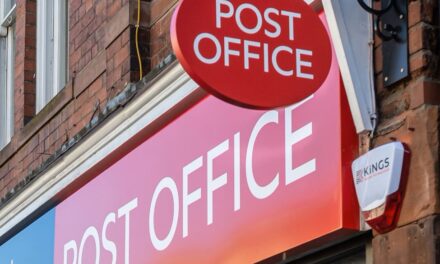
Could a first-class disaster soon wipe the smile off this postmaster's face? Post offices have provided key services for years, but with the industry in crisis we may just have to learn to live without them.
How much is a community worth? That is the decision confronting MPs and MSPs in a few weeks, as the nation wakes up to the fact that more than 10,000 post offices, including more than 1100 in Scotland, are now under real threat of closure.
Post Office chiefs told MPs last week that only 4000 offices out of 14,400 were viable, while losses had doubled from GBP2m to GBP4m a week directly due to loss of government business. In September, an obligation to stop avoidable closures runs out, and the government is due to give notice on what in 18 months will replace a GBP3m-a-week subsidy for "rural" offices – serving communities of up to 10,000 people each. A petition calling on the government to save the network last week reached two million signatures.
Postwatch, the independent watchdog, says it has been expecting government consultation to begin since last December, but it has been "repeatedly delayed and will not now take place in time to inform the decision on future funding". In May the government said John Prescott would chair a cabinet committee on the Post Office. It is at last to meet for the first time this week, just as MPs head off for their 11-week summer break.
The Post Office has launched a flood of new products in the bid to reinvent itself as a bank, recently adding a high-interest savings account to its loans, credit cards, bonds, child trust funds and insurance over the counter. But an unpublished report reveals that while subpostmasters earn an average GBP380 a month (GBP710 in deprived urban areas) in commissions from counter transactions that are under threat, the white hope of financial services is paying them just GBP7 a month. Banking, the other supposed mainstay for the future, brings in just GBP46 a month.
No wonder the report reveals that 40-per cent of the 13,800 subpostmasters on whom the network depends say they see "no future whatever" for their business. Worse, growing numbers in Scotland are borrowing money from banks and families to stave off bankruptcy.
Andrew Gilhooley, who runs the sub-office in Niddrie, Edinburgh, one of the capital's most needy areas, says: "Many offices are now hanging on by their fingertips. They are not making money – they're losing it."
Kathy Walker, branch secretary in Inverness for the National Federation of SubPostmasters, runs one of only five of 180 Highland post offices not classified as rural. She says: "Many members are not making enough money to pay their own bills but, because they feel a duty to the community, they are actually putting their own money in rather than closing up. There is only so much longer that can go on for.
"Others are borrowing money from their families and trying to make improvements to their business to make it more appealing to the public, but there is no guarantee it can be repaid. There is definitely an air of depression, but also a great desire to continue to do the best they can for their communities."
She adds: "The message coming loud and clear from every subpostmaster is: 'we wish the government would make up its mind about what it is going to do with us'."
In Scotland, 1132 of the 1694 offices are rural and 150 are in deprived urban areas, most of them under threat. But as yet there is little indication from Holyrood as to how, when, or if the Scottish Executive plans to get involved.
Jim Fitzpatrick, the postal services minister, told the trade and industry select committee last week: "Fewer than 16 people a week use the 800 smallest rural offices, at a loss of GBP17 per visit." He would not put a figure on how many closures the government wanted, saying it would only serve to stir up campaigns in communities. Last month he said: "It is not the government's fault that people are not choosing to use the Post Office."
Really? The government is the Post Office's biggest customer and, according to a report submitted to Prescott last week by Postwatch, while the Post Office made an operating loss of GBP111m last year, the value of business withdrawn by the government was GBP168m.
Three years ago the Department of Work and Pensions withdrew pension and benefit books and introduced the electronic Post Office card account, which the subpostmasters' report reveals has cut their biggest source of income from an average GBP650 to GBP250 a month. Then in a shock move earlier this year, the DWP said it would withdraw the card account altogether by 2010. That would mean the government would provide only 10-per cent of Post Office business, against 60-per cent three years ago.
Meanwhile, the government is trying to encourage card-account users to switch to their own bank cards if they have one, despite the fact that the cash cards of the two biggest Scottish banks cannot be used in post offices.
"The card account was a life-saver, " says one Edinburgh subpostmaster. "But in the past three months we have lost around 20-per cent of our card accounts because the DWP is putting pressure on people to abandon them. We also turn away about 20 people a day who want to renew their car tax here because we are not one of the offices historically allowed to do it, and DVLA won't allow any new ones. All of this means that my 'sideline' business is down by about 50-per cent. It used to pay the overheads, but it doesn't now."
LAST week, Citizens' Advice Bureau Scotland reported that parts of the nation were now a "desert" for free cash withdrawal, due to the spread of fee-charging cash machines and the restrictions on using post offices. CAB Scotland says the demise of the card account is forcing another 3.4 million people to open bank accounts in order to receive benefits, and is calling on the big banks and the Post Office to reach an agreement.
Kathy Walker says: "In these remote areas, where people have opted to get their pensions through the bank, they are having to pay GBP1.85 to get their own money."
Sandy Brunton, president of Mull and Iona Chamber of Commerce, says the disappearance of free cash machines makes an even stronger case for retaining rural post offices. His business, the Ferry Shop at Fionnphort, also accommodates the local post office, and he says not only should RBS and HBOS sign up to the network, but the banks should allow post offices to issue money on credit cards – something tourists would welcome. "Cash is still the main way of paying for goods and services here, and will be for as long as the banks make it difficult for small businesses to accept credit and debit cards by imposing charges on them, " he says.
Some 40-per cent of card account users are those who need the Post Office most, because they do not have another bank account. But Gilhooley says: "We couldn't survive on 40-per cent of the volume of work, and it would impact on the retail side because the footfall is not coming into the post office. This business has been going for 100 years, providing a service for the government, and if the government withdraws its products we are in big trouble."
Dilbag Sandhu, president of the Glasgow branch of the subpostmasters' federation, says: "The future is very bleak, and the local community will definitely suffer. The Tories could not do it, but Labour has done it indirectly – I think it is the government's deliberate policy to dismantle this very fine industry."
The cabinet committee on the Post Office includes John Hutton, whose Department of Work and Pensions is scrapping the card account to save money. It includes the new Scottish and transport secretary Douglas Alexander, whose DVLA is mounting a campaign to encourage motorists to renew their road tax discs over the internet, weakening another source of Post Office income. It also features Home Secretary John Reid, whose department has refused to allow post offices to handle interviews and biometric scanning for the proposed new digital passports and ID cards.
Bill payments are the other biggest source of subpostmasters' income, at an average GBP130 a month. But in a further shock to the system, from next week post offices will no longer be able to sell TV licence stamps, thanks to a decision by the government-sponsored BBC to give its contract to Paypoint, which operates through convenience stores but with restricted national coverage.
Ronnie Risbridger, subpostmaster at Wick in Caithness, says: "There is no Paypoint within 40 miles for many people, and yet the government has gone ahead and done it. That's what we are up against."
Subpostmasters believe there could be yet another blow, with a critical BT contract for bill-paying now up for renegotiation.
Even passport checking could be withdrawn from post offices, with the government's creation of a network of new satellite passport offices, including 12 in Scotland, to issue passports.
Trade and industry select committee member Mike Weir, SNP MP for Angus, said last week: "It is clear from the evidence we received that we are facing a mass cull of rural offices."
LibDem MP Danny Alexander, who has 47 post offices in his Highlands constituency, has written to John Prescott complaining of a "disastrous lack of joined-up government policy on post offices". The LibDems are asking Prescott to commission an audit of the social and economic value of post offices in rural communities. It may be one of the few lifelines the post offices still have.
IN THE retail jungle where the supermarket is king, closing a post office can mean handing yet more power to the big beasts. "People's shopping habits are changing and we know there has been a massive drift to out-of-town shopping and the internet, " says George Thomson, a subpostmaster in East Lothian and a member of the federation's national executive. "But the government has exacerbated the situation quite dramatically. When we had pension books I paid out GBP200,000 a year in cash to people, and a large proportion was spent in the local shops – including my own. That has drifted down to GBP100,000, and if you get money paid into a bank account rather than cash-in-hand in the post office, you are far less likely to spend it in the local shops. With post offices closing, there will be a disproportionate effect on the shops round about when large chunks of money are not getting paid out."
The Postwatch report says: "In rural areas, 15-per cent of customers' expenditure in their village or small town is directly due to the presence of a local post office." Four rural post offices out of 10 have no other shops nearby, and four out of five are far from a bank. "In many cases, it is the combination of village shop and post office that provides an acceptable, though modest, living, and the closure of the post office is very likely to result in the closure of the associated shop."
Kathy Walker says: "There is very little public transport and few people, but that doesn't mean just because you live in a village of a couple of hundred people you should be without a service." She adds: "Every community needs a focal point of some kind. Churches have amalgamated, filling stations have gone, the last of our community shops have been sold and the post offices are closing behind them."
A survey by Postwatch and the Commission for Rural Communities found 95-per cent of people in rural areas using their post office for postal services, 83-per cent for bills, 74-per cent for posting letters, 61-per cent for parcels and 51-per cent for car tax, with 41-per cent seeking informal advice from subpostmasters on government services. Almost 60-per cent of older customers still use it to access their pensions, with 86-per cent of them saying they would "lose a lot of independence" if it closed.
The post office is also "central to the perceived attractiveness of rural areas, and hence to the decision of small enterprises to start up in a particular geographical area", says the survey. The Federation of Small Businesses says that when businesses can use the local post office, they also visit other businesses and services, pumping significant extra cash into the micro-economy.
According to one FSB member: "My local post office has closed and it costs a lot in petrol – it's a 12-mile round trip to the nearest one. Even the two post boxes in the village will not take an A4 envelope. We must carry cash to and fro, so a one-man business has to close to do it."
From August 21, post will be priced by size as well as weight, with large letters costing 44p first class, adding another reason for visiting the counter. Overall, 75-per cent of survey respondents said the local post office was "extremely important" to them. Postwatch says rural closures would hurt not just the elderly and disabled, but the unemployed, young parents and those without cars.
It continues: "We are not arguing for all post offices to be retained, but we want access to services, whether through a mobile branch or a partnership with other public services."
Although some 700 branches have been moved into supermarkets or chain convenience stores since 2002, this is not always part of the solution: Tesco is closing 70 of its post-office counters, and Morrisons has ditched the ones it acquired with Safeway.
Only a handful of small post offices have so far managed to migrate into mobile libraries or other publicly-owned facilities – one in Fife is in the local police station; another near Stirling is sharing office space with VisitScotland.
More radically, a mobile walk-in post office now tours five Caithness villages four days a week, hooking up at BT poles to the Post Office's computer system to enable some 100 customers a week to do anything from withdraw cash to renew their road tax. Ronnie Risbridger, who has been running the pilot, says satellite communications could make it even more flexible, subsidy permitting, but only a well-developed retail business in the van could make it viable for an entrepreneurial successor when he steps down soon.
Different versions of this "core and outreach" model are being trialled around the UK, including in Fife and Dumfries and Galloway. Postwatch says that, after six months, the pilots appear to be working successfully. But it warns that all will depend on entrepreneurial volunteers – and in some areas, such as the Highlands, there are not even volunteers for pilots.
It says: "Over 9000 subpostmasters' livelihoods hang in the balance in rural and deprived urban areas, and clear policy guidance is needed."
It is not only more remote areas that face community break-up. In deprived urban areas, 58-per cent of people on low incomes use their local office at least once a week, and 61-per cent of residents in these areas say they would be "very inconvenienced" to lose it. A third pay their bills there, and 36-per cent say they meet friends there.
Almost 5000 offices have closed since 1995, including 151 in Scotland, in the urban network reinvention programme, from 2003-5. The plan was for government to invest GBP30m in the remaining network. But Postwatch says: "That investment has been too little, too late in comparison to the amount of money spent on closures. Three and a half years since the programme began, only 40-per cent of promised improvements have been made."
As Kathy Walker says: "I would like to put a new front door on, but why should I bother when the business may not even be here next year?"
A hard time at the office
Ambrose Young is 73 and has been working for the Post Office since he was 26. For 13 years he has been running the village post office and shop at Elphinstone in East Lothian, but he sees little prospect of being able to hand on the business.
"This is a small village with retired ex-miners who were made redundant, and they really need their post office. There are no parking facilities whatsoever at the nearest branch in Tranent, so to get the bus is more expense, and as for the bank – the hole-in-the-wall machine is free now, but for how long?"
He says Bank of Scotland and RBS will never join the post office cash network "as they stand to lose too much money", and the loss of TV licensing has been a major blow. "People are upset about it. They have been notified by the TV authorities and told there is a Paypoint in Tranent."
The trials of alternative ways of delivering rural services are a "flash in the pan", he says. "It is too high-risk. It would have to be a bank, and they would not do it – and anyway, it means the service would be cut completely. This is a full-time office at the present time."












